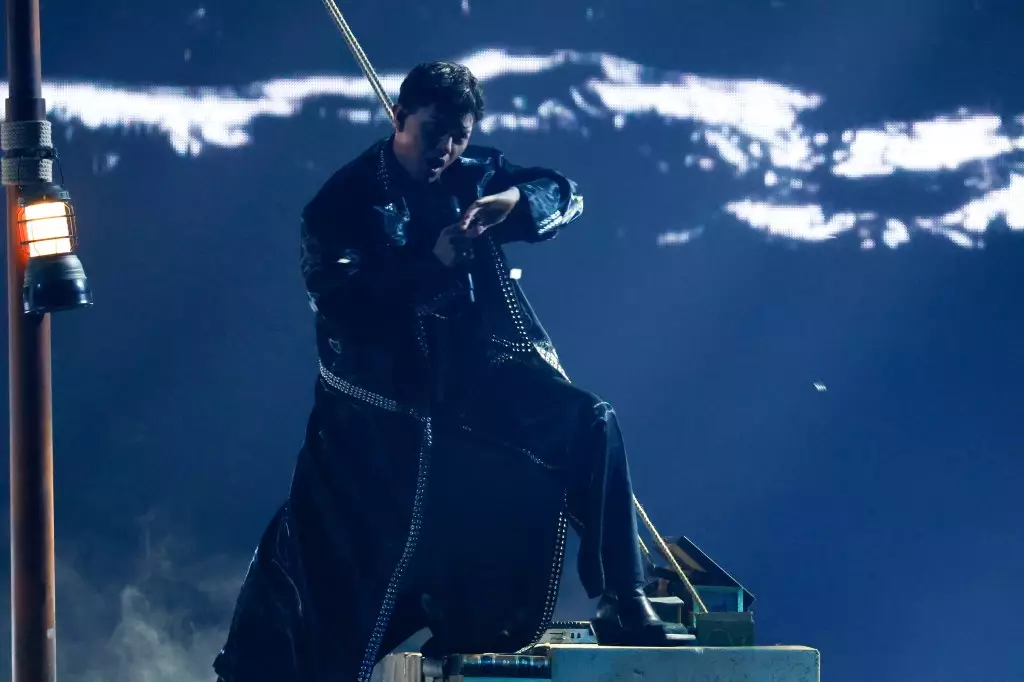The 69th Eurovision Song Contest, held in the iconic St. Jakobshalle arena in Basel, Switzerland, remained true to its reputation for extravagant displays of musical talent and a melting pot of cultural expression. This year’s winner, JJ from Austria, emerged as a beacon of emotive artistry, captivating both the audience and judges with a haunting interpretation of his ballad, “Wasted Love.” The tension in the arena was palpable as JJ’s mesmerizing falsetto cut through the air, drawing tears from his eyes as he accepted the prestigious title. The emotional depth he portrayed was not a mere performance; it was an experience that resonated deeply among millions of viewers.
The evening’s host of performances featured not just singers but a variety of intricate stage setups, showcasing the artistry that Eurovision is known for. With a remarkable mix of backgrounds, enthusiastic dancers, and cutting-edge light displays, the spectacle was a visual feast. To have the chance to see 37 countries’ performances in one night is part of what makes Eurovision such a unique communal celebration of music and culture, a rarity in today’s segmented entertainment landscape.
The Unexpected Race to Victory
Throughout the voting process, the dynamic between the competing nations was intense, exemplifying how unpredictably thrilling Eurovision can be. Initially, Switzerland and Austria traded places atop the leaderboard, only for Austria to clinch the lead triumphantly at the last moment, reflecting the cutthroat nature of the contest. However, what made this year particularly riveting was the unexpected surge of support for Israel, which, against all predictions, gained a staggering 297 viewer votes. The nail-biting final moments saw Austria emerge victorious by a mere 79 points. This close race highlights the nuances of viewer sentiment and national pride that underpin the voting audience’s decisions, making Eurovision more than just a song competition—it’s a manifestation of collective emotional expression.
Interestingly, Switzerland experienced an unprecedented dip, receiving no points—a collective gasp echoed through the crowd as this revealed the unpredictability of the voting system. The contest reinforces not just the artistry but the dramatically fluctuating perceptions of viewers toward their flag holders, underscoring just how quickly fate can change in a live musical showdown.
Eurovision’s Cultural Significance and Heritage
The enduring legacy of Eurovision, initiated in 1956, is steeped in rich history. It serves as a forum where nations showcase their cultural pride through music. This year marked a significant return, echoing back to where it all began. Director Martin Green highlighted the excitement around this homecoming, emphasizing the joyous atmospheres of Eurovision villages that deprive the mundane for a moment of idyllic festivity.
The metaphor of “coming home” encapsulates more than nostalgia; it embodies the very essence of unity through music. Despite the controversies surrounding Israel’s participation amid current global tensions, the belief that music can foster connections remains at the core of Eurovision’s mission. Green’s sentiment of romantic hope for harmony through song is a noble ideal but raises questions on how art intersects with geopolitical complexities.
Reflections on the Future of Eurovision
As the world turns increasingly volatile, the conversations inside the Eurovision community continue to evolve. The debate surrounding Israel’s participation exemplifies the complexities faced by entertainment forms as they tackle significant social issues. Numerous artists have voiced the desire for a change in how the event engages with political realities, and the response to these concerns will shape the future narrative of Eurovision.
Eurovision is more than just a competition; it’s reflective of the collective hopes and challenges facing nations today. As JJ revels in his well-deserved moment of glory, one cannot help but wonder how this contest—a blend of artistry and cultural narratives—will navigate the tumultuous political landscape in the years to come. With its ongoing evolution, Eurovision stands as a powerful reminder of the mission to unite through the universal language of music, transcending borders, and perhaps, even, fostering understanding amongst adversities.

